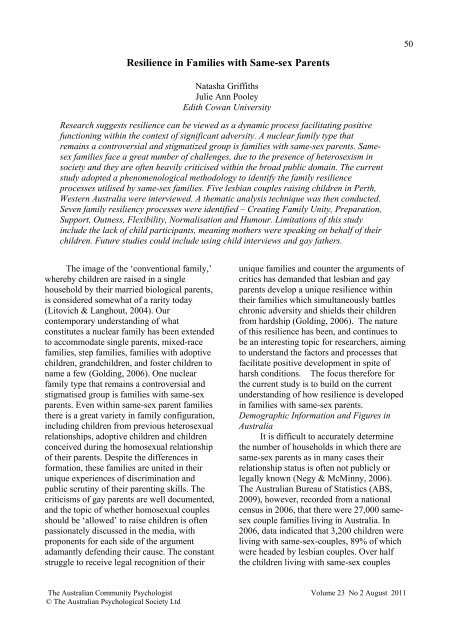The Australian Community Psychologist - APS Member Groups
The Australian Community Psychologist - APS Member Groups
The Australian Community Psychologist - APS Member Groups
Create successful ePaper yourself
Turn your PDF publications into a flip-book with our unique Google optimized e-Paper software.
50<br />
Resilience in Families with Same-sex Parents<br />
Natasha Griffiths<br />
Julie Ann Pooley<br />
Edith Cowan University<br />
Research suggests resilience can be viewed as a dynamic process facilitating positive<br />
functioning within the context of significant adversity. A nuclear family type that<br />
remains a controversial and stigmatized group is families with same-sex parents. Samesex<br />
families face a great number of challenges, due to the presence of heterosexism in<br />
society and they are often heavily criticised within the broad public domain. <strong>The</strong> current<br />
study adopted a phenomenological methodology to identify the family resilience<br />
processes utilised by same-sex families. Five lesbian couples raising children in Perth,<br />
Western Australia were interviewed. A thematic analysis technique was then conducted.<br />
Seven family resiliency processes were identified – Creating Family Unity, Preparation,<br />
Support, Outness, Flexibility, Normalisation and Humour. Limitations of this study<br />
include the lack of child participants, meaning mothers were speaking on behalf of their<br />
children. Future studies could include using child interviews and gay fathers.<br />
<strong>The</strong> image of the ‘conventional family,’<br />
whereby children are raised in a single<br />
household by their married biological parents,<br />
is considered somewhat of a rarity today<br />
(Litovich & Langhout, 2004). Our<br />
contemporary understanding of what<br />
constitutes a nuclear family has been extended<br />
to accommodate single parents, mixed-race<br />
families, step families, families with adoptive<br />
children, grandchildren, and foster children to<br />
name a few (Golding, 2006). One nuclear<br />
family type that remains a controversial and<br />
stigmatised group is families with same-sex<br />
parents. Even within same-sex parent families<br />
there is a great variety in family configuration,<br />
including children from previous heterosexual<br />
relationships, adoptive children and children<br />
conceived during the homosexual relationship<br />
of their parents. Despite the differences in<br />
formation, these families are united in their<br />
unique experiences of discrimination and<br />
public scrutiny of their parenting skills. <strong>The</strong><br />
criticisms of gay parents are well documented,<br />
and the topic of whether homosexual couples<br />
should be ‘allowed’ to raise children is often<br />
passionately discussed in the media, with<br />
proponents for each side of the argument<br />
adamantly defending their cause. <strong>The</strong> constant<br />
struggle to receive legal recognition of their<br />
unique families and counter the arguments of<br />
critics has demanded that lesbian and gay<br />
parents develop a unique resilience within<br />
their families which simultaneously battles<br />
chronic adversity and shields their children<br />
from hardship (Golding, 2006). <strong>The</strong> nature<br />
of this resilience has been, and continues to<br />
be an interesting topic for researchers, aiming<br />
to understand the factors and processes that<br />
facilitate positive development in spite of<br />
harsh conditions. <strong>The</strong> focus therefore for<br />
the current study is to build on the current<br />
understanding of how resilience is developed<br />
in families with same-sex parents.<br />
Demographic Information and Figures in<br />
Australia<br />
It is difficult to accurately determine<br />
the number of households in which there are<br />
same-sex parents as in many cases their<br />
relationship status is often not publicly or<br />
legally known (Negy & McMinny, 2006).<br />
<strong>The</strong> <strong>Australian</strong> Bureau of Statistics (ABS,<br />
2009), however, recorded from a national<br />
census in 2006, that there were 27,000 samesex<br />
couple families living in Australia. In<br />
2006, data indicated that 3,200 children were<br />
living with same-sex-couples, 89% of which<br />
were headed by lesbian couples. Over half<br />
the children living with same-sex couples<br />
<strong>The</strong> <strong>Australian</strong> <strong>Community</strong> <strong>Psychologist</strong> Volume 23 No 2 August 2011<br />
© <strong>The</strong> <strong>Australian</strong> Psychological Society Ltd

















